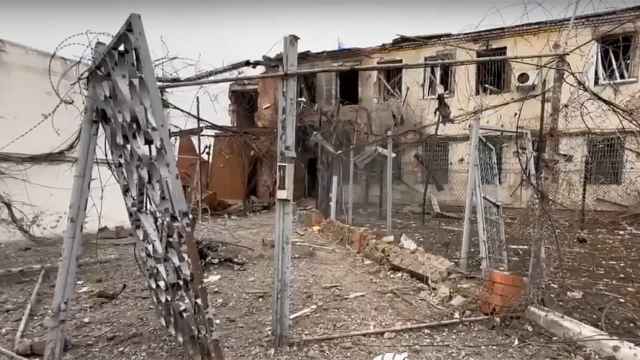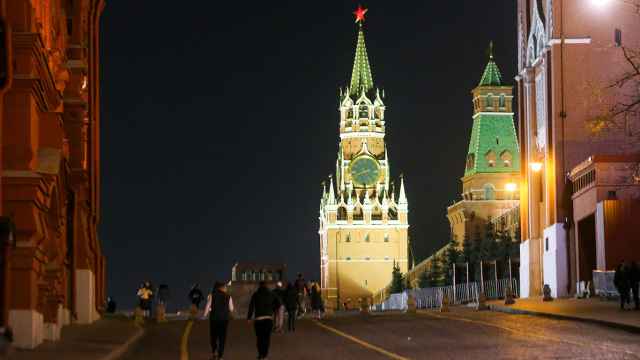There is something perplexing in Russian legal history. We can almost never say with confidence whether the law stands up for what is right or whether it is just a sword in the hands of the powerful. To Vladimir Lenin, a feckless lawyer who founded the Soviet state, the law, stripped of moral grounding, was an instrument of control to be used by the ruling class. To Russian tsars, the system of selective prosecution was a means to punish those who fell out of favor and to clear the way for new favorites.
Yelena Baturina, the richest woman in Russia and wife of former Mayor Yury Luzhkov, is now under investigation and is likely to face criminal charges in the very near future. On Thursday, police with automatic guns raided her company, one of the country’s largest construction companies. Later that day, the press service of the Interior Ministry’s Investigative Committee said an investigation was opened in a $440 million embezzlement case involving unidentified individuals in which the funds ended up in Baturina’s account.
In summer 2009, a company controlled by Baturina sold 58 hectares of land in the southwest of Moscow to Premier Estate, a company set up just three months before the deal. Premier Estate was then acquired by a British private equity group.
According to investigators, “some unidentified officers of Bank of Moscow” had fraudulently granted to Premier Estate, a company with charter capital of only $300, a loan of $440 million that subsequently appeared on Baturina’s personal account. Prosecutors claim that the value of the land was overstated and that the company never intended to repay the loan.
The barrage of news stories and comments that few people really understand create a widespread sense that the richest woman in Russia has been caught red-handed and will, at last, be held accountable. The facts, however, suggest a more complicated picture.
The land was initially owned by Baturina, and there is nothing wrong in that the money ended up in her account. She sold the land, got the money and paid taxes. This transaction was carried out openly and was widely publicized in the media.
Premier Estate is not a small, fly-by-night company but a special purpose vehicle, or SPV, which is often created for development projects to separate the project’s assets from those of its originators. The charter capital of an SPV is irrelevant. It could be $1 million, $100 or even $1. Focusing on the low sum of an SPV’s charter capital as evidence of suspicious business activity is disingenuous.
According to reputable appraisals, the land is worth $560 million, a sufficient security for the loan of $440 million. Yet the price of land is of secondary importance. In project financing, the loan is paid from cash flow generated upon project completion rather than from its assets, whose value is usually insufficient. If criminal investigations were initiated against project finance companies where assets were deemed “inadequate,” it would be impossible to develop any construction projects.
So far, it seems that the investigators do not have a case.
What we have had in effect is a taxpayer-subsidized construction industry. Privileged companies take the fruits, do not invest their own money and shift the risks onto the public. This is the real scandal. Neither Baturina’s company nor the bank nor the equity fund has made any substantial contributions into the project. If the project fails, none of them would have serious losses. If it succeeds, they would make away with generous profits.
Prosecutors’ implication that Baturina has orchestrated the swindle is an oversimplification and probably wrong. The infusion of public money into Bank of Moscow was approved by the Moscow government and the City Duma. Too many people were involved to believe that there was just one person behind the scenes.
The truth that nobody wants to face is that the country’s development business may work just like that. Though there are those who certainly benefit most, the problem is not in a certain person but in the system.
Against this backdrop, it is hardly possible to distinguish between a genuine desire to bring order and fairness into this real estate market and an attack on those who fell out of favor, the goal of which is to take control of their assets on the cheap.
Sergey Matyunin is editor of RussianLawOnline.com.
A Message from The Moscow Times:
Dear readers,
We are facing unprecedented challenges. Russia's Prosecutor General's Office has designated The Moscow Times as an "undesirable" organization, criminalizing our work and putting our staff at risk of prosecution. This follows our earlier unjust labeling as a "foreign agent."
These actions are direct attempts to silence independent journalism in Russia. The authorities claim our work "discredits the decisions of the Russian leadership." We see things differently: we strive to provide accurate, unbiased reporting on Russia.
We, the journalists of The Moscow Times, refuse to be silenced. But to continue our work, we need your help.
Your support, no matter how small, makes a world of difference. If you can, please support us monthly starting from just $2. It's quick to set up, and every contribution makes a significant impact.
By supporting The Moscow Times, you're defending open, independent journalism in the face of repression. Thank you for standing with us.
Remind me later.





